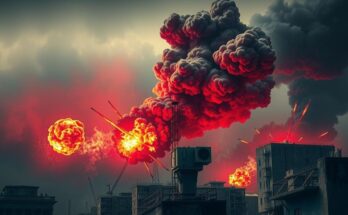Syria’s new leadership is set to engage in a national dialogue aimed at involving some political opponents. The initiative comes amid notable challenges such as the absence of key factions. President Ahmed al-Sharaa pledges inclusivity, despite skepticism about his past. Regional developments and international dynamics further complicate Syria’s political landscape, emphasizing the need for stability and cooperation among diverse groups.
Syria’s new leadership is poised to conduct a “national dialogue” with the objective of shaping the nation’s future, purportedly including some of their political adversaries. This meeting signifies progress; however, it also underscores ongoing challenges, including the absence of the primary Kurdish militia and certain groups that deemed the invitation insufficiently timely. Demonstrating potential optimism, the European Union has lifted some energy and transport sanctions to assist in Syria’s democratic evolution, with a notable trend of returning Syrian Jews showcasing confidence in the government’s minority protections. A returning rabbi was warmly greeted by a neighbor, illustrating a spirit of welcome.
President Ahmed al-Sharaa has articulated a commitment to inclusivity and elections; nonetheless, skepticism persists among Western officials regarding his intentions, given his past affiliation with Hay’at Tahrir al-Sham. A Biden administration representative, one of the initial figures to engage with al-Sharaa post-Assad regime, remarked upon the president’s capabilities, suggesting he may either be a “great actor” or an astute pragmatist seeking sanctions relief. Despite these doubts, he is gaining popularity among Syrians and is starting to solidify his position in regional politics, having received an invitation to attend the Arab League summit in Egypt.
The effectiveness of the new Syrian government hinges on its ability to balance a strong central authority with the diverse grievances of its multiple factions. Academic Rahaf Aldoughli emphasizes that maintaining cooperation among the former rebel groups that ousted Assad poses significant challenges. The dynamics are further complicated by the interests of global powers such as Russia, the UAE, and US-backed forces in various regions, alongside Israel’s expanding influence beyond the Golan Heights. The current Syrian administration perceives liberation from foreign influence as essential for fostering a stable and promising future and decisively breaking from its history.
In summary, Syria’s new leadership initiates a national dialogue inclusive of some political opponents, despite notable absences that reveal ongoing difficulties. President Ahmed al-Sharaa aims to demonstrate commitment to diversity amidst skepticism from foreign officials regarding his motives. Ultimately, balancing competing factions while navigating international interests remains pivotal for Syria’s successful political evolution and future stability.
Original Source: www.semafor.com




